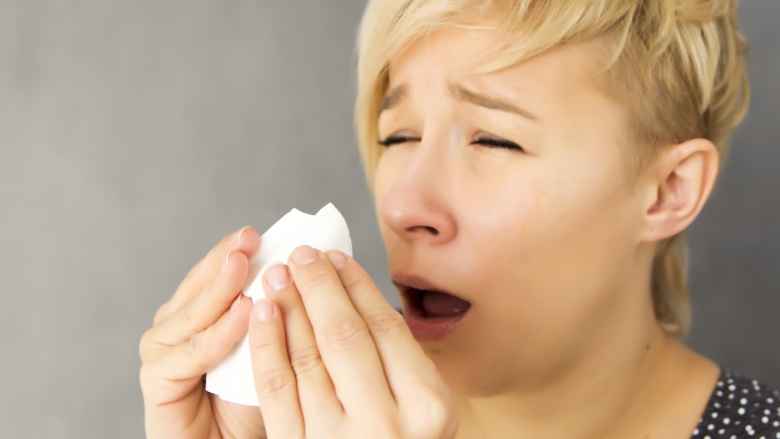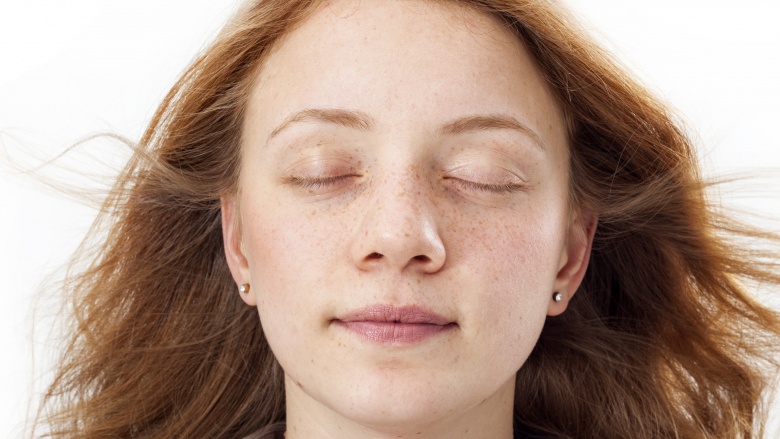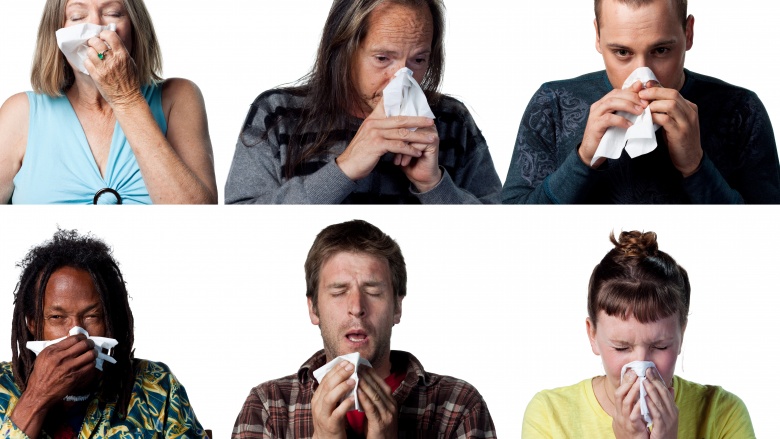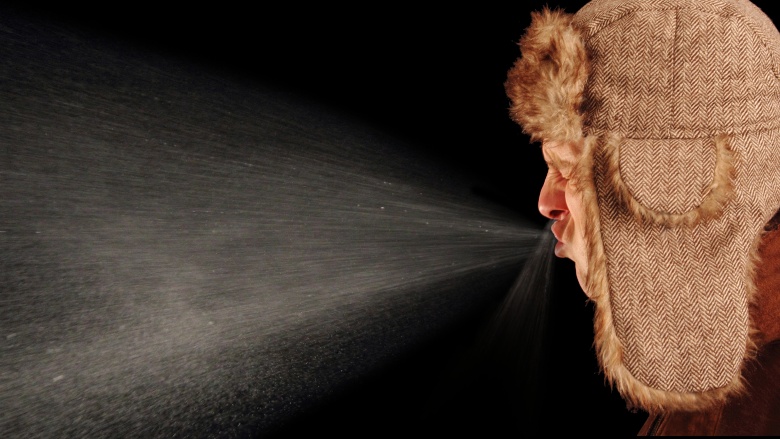What Really Happens To Your Body When You Sneeze
Depending on which side you're on (and where you happen to be standing), sneezing can either be A) incredibly embarrassing or B) frickin' hilarious. That's extra true if you happen to be someplace where social decorum hinges on silence and serenity, which makes it even harder to hold it in. So what's going on when you sneeze, anyway? It's an admittedly weird thing, and it turns out there's a lot going on. Buckle up, because it's going to be a pretty gross, and occasionally snot-covered, roller coaster.
It starts in your nose, but happens in your brain
If you're the type that likes to sound all technical and scientific and never get invited to parties, the official term for a sneeze is "sternutation." When it happens, it happens in two parts. The first is the respiratory phase, which is essentially the stimulus that starts the sneeze. You know the feeling. It can be anything from a tickle in your nose to, weirdly, a full stomach, which is apparently a thing for some people.
When you start feeling that tickling sensation that's heralding a big bout of sternutation, that's coming through something called the trigeminal nerve, which is one of the 12 nerves that run across your cranium to your face and, particularly, your nose. At the end of the nerve are a whole bunch of little receptors that are sensitive to different things, and that's where the trigger happens. When the trigger's strong enough, it kicks off a reflexive action that hits a section in your brain called the lateral medulla. That's the thing that actually tells your body it's time to get a whole lot of sternutation going on, and the signal goes off to get the rest of your body involved. That includes most of your respiratory system, some of your circulatory system, and your muscles.
Weirdly, the body's so-called "sneeze center" is an incredibly specific area pinpointed with the help of a 23-year-old patient who went to the hospital with numbness in her face and arms, the complete inability to sneeze or yawn, and the development of hiccups after eating. MRIs revealed damage to the nerves in her brain stem, and her inability to sneeze was the final symptom to remain. That gave researchers an even better idea of just where sternutation starts in the brain.
We'll stop saying "sternutation" now. Please invite us to your parties.
The body braces for impact
It's usually advertised that an average sneeze clocks in at around 100 mph, although Mythbusters concluded the number was actually somewhere between 30 and 40 mph. That's still a lot of force to come out of your face, and part of the body's reflex is to brace for it. In a split-second, the muscles in your upper body tense, rooting you to the spot. (We admit it. We totally want to see an experiment that makes the body bypass this particular step.)
In a process that happens incredibly fast (it only lasts about 2 or 3 seconds), the muscles in your throat contract and the brain tells your eyes to shut. (More on that in a minute.) Also closing? Your palate. Contractions in the muscles of your throat and mouth are what gives the sneeze its power, expelling up to 5,000 little droplets from your mouth and nose. The mouth-spit? That's the stuff that sits between your lower lip and your gums. TMI? Hey, you asked.
Does your heart really stop? Sort of
There's a couple of old wives' tales that get told about what happens when you sneeze. One of them is that a bit of your soul can escape. Fortunately, we've been told we don't have a soul, so no worries there. Another one is that your heart stops in the instant you sneeze, and this is one tall tale that's ... actually got a bit of truth to it.
According to Dr. Christopher Magovern from New Jersey's Morristown Medical Center, part of your body's prep work for sneezing means taking a deep breath. That, and the muscle contractions, puts pressure on your chest and can make your heart skip a beat. Your heart rate actually drops, but he also says that's not exclusive to sneezing. There's a lot of other types of stimulus that can make the same thing happen, even coughing.
Most of us don't notice if our heart stutters, as we're presumably too busy apologizing, cleaning ourselves up or, in extreme circumstances, cleaning someone else up. In some cases though, people can experience a fainting spell triggered by the sneeze. It's called glossopharyngeal neuralgia (we won't use that term again, spelling it once was bad enough), and it's caused by the pressure on the carotid sinus, which is one of the main arteries in your neck. It's a rare condition, but sneezing can interfere with the artery (and your heart rate), to occasionally make you hit the floor when it happens. Nothing in the study says who's responsible for the cleanup if that happens.
Can you damage your eyes if you don't close them?
You've probably heard this myth, too — that if you don't close your eyes when you sneeze, they'll pop right out of your head. (RIP, Glenn. We miss you.) That makes sneezing absolutely terrifying, but it's absolutely not true.
There's actually been a few recorded cases of people whose sneeze reflex doesn't include the part about closing their eyes, and we know they don't experience the thing that's making you cringe right now. We've known for a long time that our eyes are held pretty firmly in place by six different muscles, and that it takes an ungodly amount of force (or Lucille) to dislodge them in what's called luxation. Even when it does happen, it's usually not to an extreme extent, and doctors can push a dislocated eyeball back into place.
Are you cringing again? WE'RE SO SORRY.
What's going on that makes some people do three sneezes at once?
So, what's the deal with those annoying people that can't seem to be satisfied with the attention they get from one sneeze, and who have to do it again until we just plain give up with the "Bless yous" and "Gesundheits"? You're right — these people really are high maintenance.
According to Dr. Jordan S. Josephson of New York City's Lennox Hill Hospital, those sneezes are typically caused by an irritant that gets stuck along the person's nasal passages. When this happens, some people are unable to clear it with just one sneeze, and it can take a sneeze or two to dislodge the foreign particles, and another sneeze or two to send it rocketing out the nose. So, someone who does it might not be doing it on purpose, but they're definitely not sneezing as efficiently as the rest of us. That's right, Janet in Accounting, we're looking at you. And we're not saying "Bless you" again.
We create a literal cloud of sneeze-dust
We told you it was going to get disgusting, and we weren't just talking about the eyeball thing. We all know that sneezing can be pretty gross, especially if you're in a car or near a window (or anything else that could catch the splatter. We mentioned the 5,000 water droplets number, too, but it was MIT that got the most disgusting look at just what comes out of someone's mouth and nose when they sneeze. (In case you're wondering, they didn't have some sort of weird fetish. They were doing the experiments to help document the spread of infectious diseases.)
MIT basically set up some high-speed cameras and got people to sneeze in front of them. The cameras caught the supersonic spit-show in a series of photos that showed just how the sneezes spread, all in a timeframe that roughly 200 milliseconds long. First, the similarities. In all 100 sneezes, the spit-and-snot cocktail formed a sweeping sheet that literally blows up like a balloon, when air from the sneeze pushes the mucus ahead of it. The balloons burst pretty quickly and when they do, they turn into long strands and filaments ... and clouds.
Yes, literal clouds. The crap that comes shooting out in a sneeze creates clouds that then make it even more portable. Lydia Bourouiba, the mathematician leading the MIT team, found that not only do sneezes form what has to be the most disgusting cloud ever, but it allows the goo to travel across a room and even (again, we're sorry, but you did ask) up through a ventilation shaft. Yikes. You'll never be able to un-know that.
Why do some people have dainty little sneezes and others, well, don't?
There's two types of people in this world. There's the ones that have a little tiny, dainty sneeze that doesn't even sound like a sneeze, leaving you wondering whether to even say "Gesundheit," and by the time you've decided, it's too late and it's only led to an awkward social situation. Then there's the people with sneezes so loud and violent they cause car accidents, even when they're not in the car. (Well, technically we suppose there's three types. There's also the type that sneezes into their trombone. Seriously, it's hilarious.)
So what's the deal? Apparently, part of it is a matter of lung capacity. The bigger the breath, the louder the sneeze. There's also a matter of control, and a 2006 study found that most people admit they consciously have a couple of different kinds of sneezes. There's the polite society sneeze that happens when they try to make the least amount of noise as possible, and then there's the "behind-closed-doors, I'm-not-wearing-pants-anyway-so-the-sneeze-won't-make-me-more-offensive" sort of sneezes. Some people have more control over what happens after the reflex action kicks off, and that allows them to sneeze like mice, while others will always give the cat a heart attack.
You could get hurt
Your eyeballs might not be going anywhere, but experts say that you really can get hurt during a sneeze. According to the Cleveland Clinic, holding back a sneeze can build up some serious pressure inside your skull — in some cases, it could damage your eardrums or your sinuses. You might even give yourself an ear infection, because all those snot-droplets that form clouds and float away? They have to go somewhere, and if you hold in a sneeze, they can get pushed into your middle ear.
Most of the injuries seem to happen when you're trying to hold in a sneeze that's already in progress, and stopping one before the medulla kicks into high gear isn't necessarily a bad thing. There's been cases where the pressure of a blocked sneeze can burst blood vessels in the eyes, or even rupture an eardrum. If you do it a lot (or you have some sort of super-weird abnormality in your anatomy) you can be even more susceptible to injury.
There's some individual cases where sneezing can be a horrible, horrible experience, like a four-year-old girl from Jharkhand, India who suffers from a condition called Osteogenesis imperfecta, which means her bones are unnaturally brittle, and her muscle tissue is weak. Every time she sneezes (or even coughs), she breaks a bone from the force of the action. There's currently no cure for her condition, and that officially makes getting sneezed on not the worst thing that can happen to you.
Sneezing and sex
Go on, get your chuckles out. We already did. There's a rumor floating around that sneezing once or seven times gives the same brain-feelings as an orgasm. We admit, we're a little cynical about this one because, if true, explain all those people who loudly complain every time they come down with hay fever.
However, the scientific world isn't one to miss out on any grant money, so they've looked into it, and concluded that its true. Sort of. According to University of Sydney sexologist Vanessa Thompson, sneezing really does release feel-good hormones into the brain, specifically endorphins. Part of the fuzzy feeling you get after a particularly good sneeze likely has something to do with these chemicals, but truthfully, it's likely got more to do with the relief that the tickling is gone. Plus, since the effects of sneezing aren't cumulative, it's not like lots of endorphins are going to build up in your brain and make other things feel all warm and fuzzy.
However, it turns out that there is a weird connection between sex and sneezing. In 1972, the Journal of the American Medical Association took a look at the case of a 69-year-old man who reported suffering from sneezing attacks right after an orgasm. (We're not going to comment. We're going to keep it *classy*.) In 2008, a paper submitted to the Journal of the Royal Society of Medicine took a look at this man's issue, in the context of an incredibly Victorian observation made in the 1880s. Back then, one man suggested there was such a similarity in "erectile tissue" that sneezing really was a headgasm. It was such a weird theory, he was even disowned by his one-time close friend, Sigmund Freud. And we all know what a nutter he could be.
Researchers did some trolling through anonymous chat rooms, because where else is anyone going to talk about this? They found there was a surprising number of people who experienced the connection but, for some reason, only really talked about it in internet chat rooms. It (along with other weird sneezing issues, like sneezing after eating) seems to happen when other sensations trigger the trigeminal nerve, and, well, your medulla gets all confused. We like to think it's blushing.
What about when you sneeze in space?
Admit it — you're curious about what really goes on up there in space, and how comfortable people have to be with their bodily functions to share such terrifying, claustrophobically close living quarters. According to International Space Station veteran Dave Wolf, sneezing happens in space just like it does on Earth. He's gone spacewalking more times than you can count on one hand, and he says there's no way to keep from sneezing. The only thing you can do, he says, is aim for a part of your helmet that's not a visor or right in your line of sight. Because ... ew.
It turns out, that's not as much of a weird thought as you might think, as sneezing has caused some serious issues for NASA. The crew of the Apollo VII nearly headed up a revolution against the rules and regulations of the space agency, and the only reason they didn't was because there was only three of them. They had developed severe head colds during their 11-day-mission, though, that ended with the permanent grounding of two crew members and the retirement of another. (He went on to become a spokesperson for Actifed, a cold medicine. Seriously. You can't make this up.)
NASA's infectious germ studies found that, while gravity forces snot particles to eventually land on Earth, a single sneeze in space can cover literally everything. Once they discovered that, they started looking at improving hygiene and air filtration systems to keep colds and other infectious diseases from spreading through a spacecraft at the speed of light. Because, after two weeks in cramped quarters with the same few people, it doesn't take much before someone's spending two damn hours panel-beating their helmet back into shape. A sneeze? Them's fighting words.









